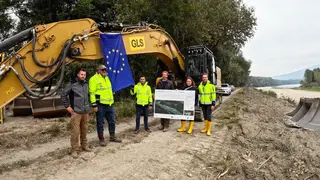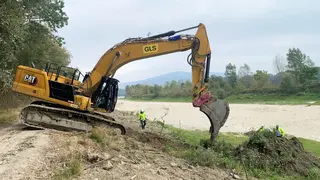Within the framework of the Horizon 2020 project MERLIN, viadonau brings more life to the floodplain. As part of the international, EU co-financed project to restore freshwater ecosystems the bank restoration in the Hainburger Au in the Donau-Auen National Park was officially launched on 19 October 2023. The resulting natural river bank improves the connectivity of the floodplain with the Danube and thus also the life and biodiversity along the river.
The kick off for the construction measures was immediately followed by specific activities and changes on site. Under ideal conditions, with dry weather and low water levels, the construction company GLS, in the presence of the project clients from viadonau, the local construction supervision by Schneider Consult Ziviltechniker GmbH and the Donau-Auen National Park, was able to quickly tackle the work.
“Currently, the bank protection is being uncovered and rootstocks on the embankment are being removed”, explains Alice Kaufmann, who is in charge of construction implementation for viadonau. The Japanese knotweed - a particularly persistent neophyte on the Danube - is being professionally thermally disposed of. Once the subsequent work to prepare the bank has been completed with the help of heavy dredging equipment and the knowledge of viadonau's experts in ecological hydraulic engineering, nature can once again take over the actual shaping of a natural riverbank. “The construction measures are implemented with the greatest possible protection of the environment. The Donau-Auen National Park provides ecological construction supervision”, Kaufmann says.
Robert Tögel, coordinator of the river engineering projects in the Danube floodplains, emphasises the scientific component of the project: "The experience gained from our case study on the Austrian Danube will be evaluated via the MERLIN project and combined with findings from other projects. In this way, we can learn more for future renaturation projects throughout Europe.” For this purpose, the riverbank restoration is evaluated by the national scientific partner, the University of Natural Resources and Life Sciences, Vienna (BOKU) through pre- and postmonitoring activities and scientifically accompanied together with the MERLIN consortium, which consists of 44 European partners and is led by the University of Duisburg-Essen.
Further information:
MERLIN in the viadonau project database
MERLIN project website


